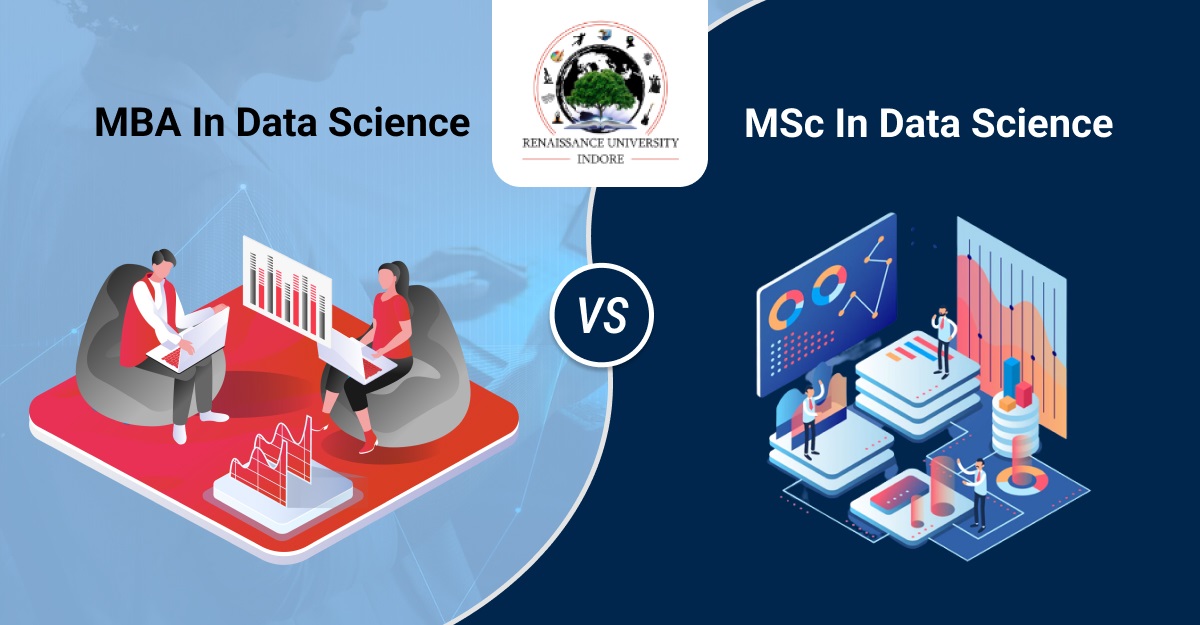The topic of this blog post is the comparison between an MBA in Data Science and an MSc in Data Science. The growing field of data science and the increasing demand for professionals with skills in this area make this topic relevant to the reader. The blog post will provide readers with an in-depth understanding of both MBA and MSc in Data Science programs and their curriculum, career opportunities, and job prospects, which will help them make an informed decision when choosing between the two programs. The blog post will also give readers a clear picture of the key differences between an MBA and an MSc in Data Science and the advantages of each, this will help them to choose the program that aligns with their career aspirations and academic background.
What is an MBA in Data Science?
An MBA in Data Science is a graduate-level degree program that combines traditional business and management education with data science skills and knowledge. It is designed to prepare students for leadership roles in data-driven organizations. The program typically covers a broad range of topics, including data mining, machine learning, statistics, and visualization, as well as business-related subjects such as finance, marketing, and operations. The curriculum also includes coursework in management and leadership, as well as data-driven decision-making. MBA in Data Science programs often includes a capstone project where students apply their knowledge and skills to a real-world problem or business case. The program typically takes around 2 years to complete on a full-time basis.
MBA in Data Science Curriculum and Coursework
An MBA in Data Science program typically covers a wide range of topics that are essential for leading data-driven organizations. The curriculum typically includes coursework in both business and data science.
Some of the common coursework covered in an MBA in Data Science program include:
Data Mining and Machine Learning: Students learn about the various techniques used in data mining and machine learning, including supervised and unsupervised learning, as well as algorithms such as decision trees, clustering, and neural networks.
Data Analysis and Statistics: Students learn about statistical methods and techniques used to analyze and interpret data, including descriptive statistics, probability, hypothesis testing, and regression analysis.
Data Visualization and Communication: Students learn about the importance of data visualization and communication in data science, including how to create effective data visualizations and communicate data-driven insights to stakeholders.
Business Fundamentals: Students learn about the fundamental concepts of business, including finance, accounting, marketing, and operations.
Data-Driven Decision-Making: Students learn about the use of data in a decision-making and how to apply data science techniques in real-world business scenarios.
Management and Leadership: Students learn about the management and leadership skills needed to lead data-driven organizations, including project management, strategic planning, and team building.
Capstone Project: Students complete a capstone project where they apply their knowledge and skills to a real-world problem or business case.
Additionally, students may have the opportunity to take elective courses that align with their specific interests, such as natural language processing, deep learning, big data management, and more.
Eligibility Criteria for MBA in Data Science Programs
The eligibility criteria for MBA in Data Science programs can vary depending on the institution offering the program. However, some common requirements for most MBA in Data Science programs include:
- Undergraduate degree: Most MBA in Data Science programs require applicants to have a bachelor’s degree in any field, although some programs may prefer or require applicants to have a degree in a related field such as mathematics, statistics, computer science, or engineering.
- Work experience: Some MBA in Data Science programs require applicants to have a certain amount of work experience, typically 2-3 years. This is to ensure that students have a certain level of maturity and professional experience to be able to understand the business aspects of data science.
- GMAT/GRE scores: Most MBA in Data Science programs require applicants to submit scores from the Graduate Management Admission Test (GMAT) or Graduate Record Examination (GRE). These scores are used to evaluate the applicant’s quantitative and verbal abilities and are considered an indicator of the applicant’s potential for success in an MBA program.
- Language proficiency: Some MBA in Data Science programs may require applicants to demonstrate proficiency in English, either through TOEFL or IELTS scores or by submitting a writing sample.
- Interview: Some MBA in Data Science programs may require applicants to participate in an interview as part of the admissions process. This is to help the admissions committee evaluate the applicant’s motivation, goals, and fit for the program.
It is important to check with the specific institution offering the program for their specific requirements and to have a clear understanding of the program’s prerequisites and application process before applying.
MBA in Data Science Career Opportunities And Job Prospects
Graduates of an MBA in Data Science program have a wide range of career opportunities available to them, as the field of data science is rapidly growing and in high demand across many industries. Some of the most common career paths for graduates include:
Data Analyst: Graduates with an MBA in Data Science can work as data analysts, where they use data to identify trends and patterns and make recommendations to improve business performance.
Business Intelligence Analyst: Graduates with an MBA in Data Science can work as business intelligence analysts, where they use data to generate insights that inform business decisions.
Data Scientist: Graduates with an MBA in Data Science can work as data scientists, where they use data to develop predictive models, identify new business opportunities, and support decision-making.
Management Consultant: Graduates with an MBA in Data Science can work as management consultants, where they use data and analytical skills to help organizations improve their performance.
Marketing Analyst: Graduates with an MBA in Data Science can work as marketing analysts, where they use data to identify customer trends and preferences and inform marketing strategy.
Operations Analyst: Graduates with an MBA in Data Science can work as operations analysts, where they use data to optimize manufacturing, supply chain, and logistics processes.
In addition to these career paths, there are many other roles where MBA in Data Science graduates can leverage their skills, such as Data Governance, Risk Management, Data Engineering, and more.
The job prospects for graduates of an MBA in Data Science program are generally very strong, as the demand for data science professionals continues to grow. According to a recent report, the job market for data science professionals is projected to grow by 11.5% by 2026. Additionally, MBA in Data Science graduates is in high demand across many industries, such as technology, healthcare, finance, retail, and more.
What an MSc in Data Science is and What it entails.
An MSc in Data Science is a graduate-level degree program that focuses on the study of data and its applications. It is designed to provide students with a strong foundation in the theoretical and technical aspects of data science, including data analysis, machine learning, and statistics. The program typically covers a wide range of topics such as data mining, data visualization, data management, and statistical modeling. MSc in Data Science programs often includes a research component, where students conduct independent research projects or participate in research projects led by faculty members. The program typically takes around 1-2 years to complete on a full-time basis.
The curriculum for an MSc in Data Science program is designed to provide students with a strong foundation in the theoretical and technical aspects of data science, including:
- Data Analysis and Statistics: Students learn about statistical methods and techniques used to analyze and interpret data, including descriptive statistics, probability, hypothesis testing, and regression analysis.
- Data Mining and Machine Learning: Students learn about the various techniques used in data mining and machine learning, including supervised and unsupervised learning, as well as algorithms such as decision trees, clustering, and neural networks.
- Data Visualization and Communication: Students learn about the importance of data visualization and communication in data science, including how to create effective data visualizations and communicate data-driven insights to stakeholders.
- Data Management: Students learn about the principles and techniques of data management, including data warehousing, data integration, and data governance.
- Programming: Students learn about the programming languages and tools commonly used in data science, such as Python, R, SQL, and more.
- Research Methodology: Students learn about research methods and techniques used in data science, including experimental design, data cleaning, and statistical analysis.
- Thesis or Research Project: Students complete a thesis or research project where they apply their knowledge and skills to an independent research project or participate in a research project led by faculty members.
MSc in Data Science programs are typically geared towards students who want to pursue a career in academia or research, or those who want to specialize in a specific area of data science such as natural language processing, computer vision, or bioinformatics.
MSc in Data Science Curriculum and Coursework
The curriculum for an MSc in Data Science program is typically designed to provide students with a strong foundation in the theoretical and technical aspects of data science. Common coursework covered in an MSc in Data Science program includes:
- Data Analysis and Statistics: Students learn about statistical methods and techniques used to analyze and interpret data, including descriptive statistics, probability, hypothesis testing, and regression analysis.
- Data Mining and Machine Learning: Students learn about the various techniques used in data mining and machine learning, including supervised and unsupervised learning, as well as algorithms such as decision trees, clustering, and neural networks.
- Data Visualization and Communication: Students learn about the importance of data visualization and communication in data science, including how to create effective data visualizations and communicate data-driven insights to stakeholders.
- Data Management: Students learn about the principles and techniques of data management, including data warehousing, data integration, and data governance.
- Programming: Students learn about the programming languages and tools commonly used in data science, such as Python, R, SQL, and more.
- Research Methodology: Students learn about research methods and techniques used in data science, including experimental design, data cleaning, and statistical analysis.
- Specialization courses: students will have the opportunity to take elective courses that align with their specific interests, such as natural language processing, deep learning, big data management, bioinformatics, computer vision, and more.
- Thesis or Research Project: Students complete a thesis or research project where they apply their knowledge and skills to an independent research project or participate in a research project led by faculty members.
The curriculum for MSc in Data Science programs often includes a mix of theoretical and practical coursework, with an emphasis on hands-on experience and application of data science methods and techniques. Some programs may also include internships or co-op opportunities where students can gain real-world experience in data science.
MSc in Data Science Career opportunities and job prospects
Graduates of an MSc in Data Science program have a wide range of career opportunities available to them, as the field of data science is rapidly growing and in high demand across many industries. Some of the most common career paths for graduates include:
- Data Scientist: Graduates with an MSc in Data Science can work as data scientists, where they use data to develop predictive models, identify new business opportunities, and support decision-making.
- Data Engineer: Graduates with an MSc in Data Science can work as data engineers, where they design and build data pipelines, data storage, and data management systems.
- Machine Learning Engineer: Graduates with an MSc in Data Science can work as machine learning engineers, where they design, develop and implement machine learning models and algorithms.
- Research Scientist: Graduates with an MSc in Data Science can work as research scientists, where they conduct research in data science, machine learning, artificial intelligence, and other related fields.
- Business Intelligence Analyst: Graduates with an MSc in Data Science can work as business intelligence analysts, where they use data to generate insights that inform business decisions.
- Data Analyst: Graduates with an MSc in Data Science can work as data analysts, where they use data to identify trends and patterns and make recommendations to improve business performance.
In addition to these career paths, there are many other roles where MSc in Data Science graduates can leverage their skills, such as data governance, risk management, data visualization, and more. The job prospects for graduates of an MSc in Data Science program are generally very strong, as the demand for data science professionals continues to grow. According to a recent report, the job market for data science professionals is projected to grow by 11.5% by 2026. Additionally, MSc in Data Science graduates is in high demand across many industries, such as technology, healthcare, finance, retail, and more.
Compare and contrast the MBA and MSc in Data Science Programs
MBA in Data Science and MSc in Data Science programs both provide students with the knowledge and skills needed to work in the field of data science, but they differ in terms of their curriculum, career opportunities, and job prospects.
Curriculum:
- MBA in Data Science programs covers a broad range of topics, including data mining, machine learning, statistics, and visualization, as well as business-related subjects such as finance, marketing, and operations. The focus of the MBA program is on the business and management aspects of data science.
- MSc in Data Science programs, on the other hand, focuses more heavily on the technical and theoretical aspects of data science, including data analysis, statistics, data mining, and machine learning. The focus of the MSc program is on the technical and research-oriented aspects of data science.
Career opportunities:
- MBA in Data Science graduates tends to have more career opportunities in management and leadership roles, such as business analytics manager, business intelligence manager, and data science manager. They are also well-suited for roles that require both technical and business skills, such as management consultant, marketing analytics manager, or operations analytics manager.
- MSc in Data Science graduates tends to have more career opportunities in technical roles, such as data scientist, data engineer, machine learning engineer, and research scientist. They are also well-suited for roles that require more in-depth technical skills and research-oriented skills, such as data analysis and business intelligence analyst.
Job prospects:
- The job prospects for graduates of both MBA in Data Science and MSc in Data Science programs are generally very strong, as the demand for data science professionals continues to grow. According to a recent report, the job market for data science professionals is projected to grow by 11.5% by 2026. Additionally, MBA and MSc in Data Science graduates are in high demand across many industries, such as technology, healthcare, finance, retail, and more. However, the job prospects for MBA in Data Science graduates are a bit broader and more versatile in terms of the fields they can work in, as the MBA program focuses on the business aspects of data science.
Differences between an MBA and an MSc in Data Science and the advantages of each.
The MBA and MSc in Data Science programs both provide students with the knowledge and skills needed to work in the field of data science, but they have some key differences in terms of their curriculum, career opportunities, and job prospects.
Curriculum:
- MBA in Data Science programs covers a broad range of topics, including data mining, machine learning, statistics, and visualization, as well as business-related subjects such as finance, marketing, and operations. The focus of the MBA program is on the business and management aspects of data science.
- MSc in Data Science programs, on the other hand, focuses more heavily on the technical and theoretical aspects of data science, including data analysis, statistics, data mining, and machine learning. The focus of the MSc program is on the technical and research-oriented aspects of data science.
Career opportunities:
- MBA in Data Science graduates tends to have more career opportunities in management and leadership roles, such as business analytics manager, business intelligence manager, and data science manager. They are also well-suited for roles that require both technical and business skills, such as management consultant, marketing analytics manager, or operations analytics manager.
- MSc in Data Science graduates tends to have more career opportunities in technical roles, such as data scientist, data engineer, machine learning engineer, and research scientist. They are also well-suited for roles that require more in-depth technical skills and research-oriented skills, such as data analysis and business intelligence analyst.
Advantages of an MBA in Data Science:
- The MBA in Data Science program provides students with a strong business and management background, which can be an advantage for those interested in leadership roles in data-driven organizations.
- The MBA in Data Science program provides students with a broader perspective and understanding of how data science can be applied to various business areas, such as marketing, finance, and operations.
- The MBA program provides students with the ability to communicate data-driven insights to stakeholders, which is essential for business decision-making and presenting recommendations to a non-technical audience.
Advantages of MSc in Data Science:
- The MSc in Data Science program provides students with a strong technical background in data science, which can be an advantage for those interested in more technical roles in data-driven organizations.
- The MSc in Data Science program provides students with a deeper understanding of the theoretical and technical aspects of data science, such as data mining, machine learning, and statistics.
- The MSc program provides students with the opportunity to conduct independent research projects or participate in research projects led by faculty members, which can be an advantage for those interested in pursuing a career in academia or research.
- The MSc program provides students with the ability to specialize in a specific area of data science, such as natural language processing, computer vision, or bioinformatics, which can be an advantage for those interested in a niche field.
Top Data Analytics Masters Programs
Let’s explore some of the top data analytics master programs in India, shedding light on the distinctive features of each.
-
Indian School of Business (ISB), Hyderabad:
ISB is renowned for its globally recognized business programs, and its Post Graduate Program in Business Analytics (PGPBA) is no exception. The curriculum is designed in collaboration with top industry experts, ensuring students gain real-world insights. The program covers a wide array of topics, including statistical methods, machine learning, and big data technologies.
-
Indian Statistical Institute (ISI), Kolkata:
Known for its excellence in statistics and analytics, ISI offers a Master of Science in Quality Management Science with a specialization in Data Analytics. The program places a strong emphasis on statistical methods and their applications in various domains. Graduates from ISI are highly sought after in both academia and industry.
-
Great Lakes Institute of Management, Chennai:
The Post Graduate Program in Business Analytics (PGPBA) at Great Lakes is tailored to meet the industry’s evolving demands. The program combines classroom learning with hands-on experience through industry projects. Students benefit from the institute’s strong ties with analytics companies, providing them with networking opportunities and placement prospects.
-
University of Delhi, New Delhi:
The Department of Operational Research at the University of Delhi offers a Master’s in Operational Research with a focus on analytics. The program equips students with a solid foundation in mathematical modeling and statistical analysis. Delhi’s vibrant academic environment and proximity to government and corporate institutions contribute to a holistic learning experience.
-
Renaissance University:
Now, let’s shine a spotlight on Renaissance University, an emerging player in the data analytics education sector. What sets Renaissance University apart is its innovative approach to teaching analytics. The curriculum is designed not only to impart technical skills but also to foster critical thinking and problem-solving abilities.
The Master of Science in Data Analytics at Renaissance University incorporates the latest industry trends, ensuring that students are well-prepared for the rapidly evolving field. The program covers a broad spectrum of topics, including data visualization, predictive modeling, and data-driven decision-making.
One standout feature of Renaissance University is its strong industry connections. Collaborations with leading analytics firms provide students with internship opportunities, giving them hands-on experience and a competitive edge in the job market.
The university also prioritizes research and encourages students to engage in projects that contribute to the field’s knowledge base. This commitment to research excellence enhances the overall learning experience and positions Renaissance University as a hub for cutting-edge advancements in data analytics.
Key points
In summary, the MBA in Data Science and MSc in Data Science programs both provide students with the knowledge and skills needed to work in the field of data science, but they have some key differences in terms of their curriculum, career opportunities, and job prospects. The MBA in Data Science program provides students with a strong business and management background, as well as a broader perspective on how data science can be applied to various business areas. The MSc in Data Science program provides students with a strong technical background in data science, a deeper understanding of the theoretical and technical aspects of data science, and the opportunity to conduct independent research projects or participate in research projects led by faculty members.
For readers considering a career in data science, it is important to consider what type of role they are interested in and what type of program aligns with their goals and interests. If you’re interested in management and leadership roles and want to understand how data science can be applied to various business areas, an MBA in Data Science may be the right choice for you. On the other hand, if you’re interested in a more technical role in data science, or want to conduct research in data science, an MSc in Data Science may be a better fit. Additionally, it is a good idea to research different programs and speak with current students or alumni to get a better understanding of the curriculum, career opportunities, and job prospects.







